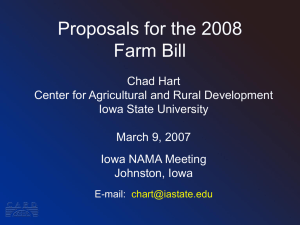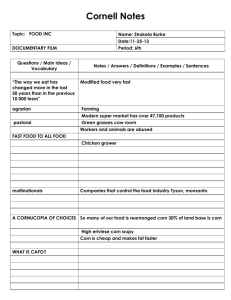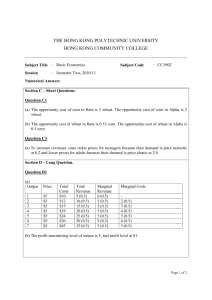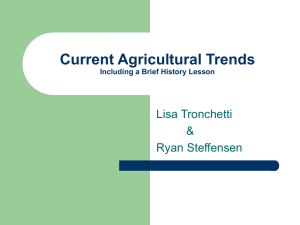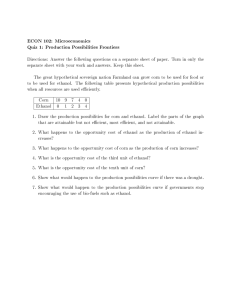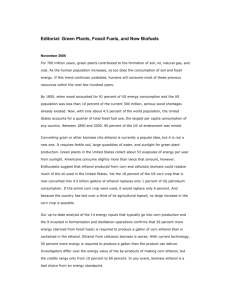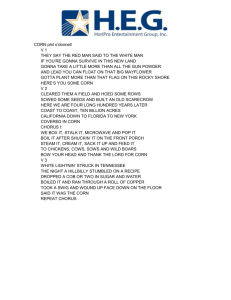Biofuel Impacts on Agriculture
advertisement
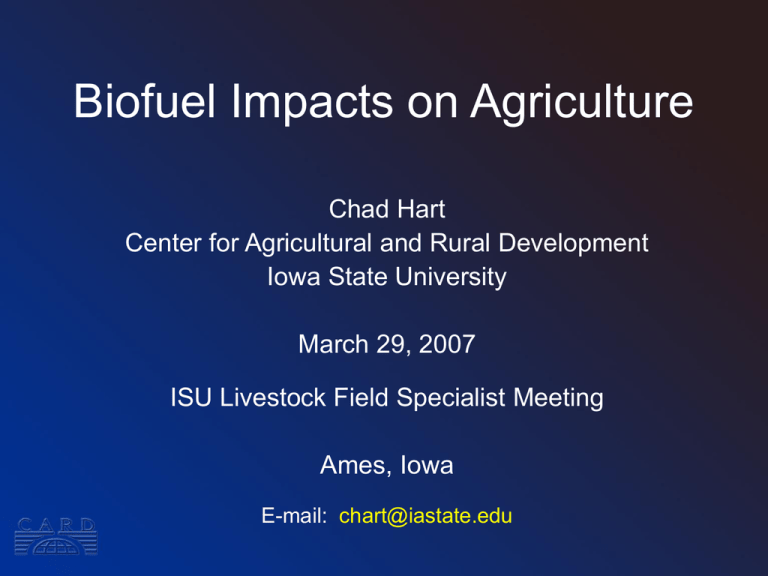
Biofuel Impacts on Agriculture Chad Hart Center for Agricultural and Rural Development Iowa State University March 29, 2007 ISU Livestock Field Specialist Meeting Ames, Iowa E-mail: chart@iastate.edu Projected World Oil Consumption Source: Energy Information Administration, International Energy Outlook 2006 Projected World Energy Sources Source: Energy Information Administration, International Energy Outlook 2006 World Ethanol Production, 2006 6% 7% 1% 6% 39% 8% 33% U.S. Brazil China Europe Africa Asia Rest of World World Ethanol Imports, 2006 7% 2% 13% 9% 66% 3% U.S. EU India Japan South Korea Rest of World 19 80 19 82 19 84 19 86 19 88 19 90 19 92 19 94 19 96 19 98 20 00 20 02 20 04 20 06 Billion Gallons 6 U.S. Ethanol Production 5 4 3 2 1 0 Source: Renewable Fuels Association 300 U.S. Biodiesel Growth Million Gallons 250 200 150 100 50 0 1999 2000 2001 2002 2003 2004 2005 2006 Source: National Biodiesel Board 35 Renewable Fuels Standard Billion Gallons 30 25 20 15 10 5 0 2006 2007 2008 2009 2010 2011 2012 2017 Ethanol Industry Snapshots Jan. 2000 Jan. 2001 Jan. 2002 Jan. 2003 Jan. 2004 Jan. 2005 Jan. 2006 Jan. 2007 Ethanol Plants 54 56 61 68 72 81 95 110 Source: Renewable Fuels Association Capacity (mgy) 1,749 1,921 2,347 2,707 3,101 3,644 4,336 5,386 Ethanol – State by State State IA IL NE MN SD WI KS IN MO MI ND CO CA TN KY NM WY OH FL OK GA Current Capacity (million gallons) 1,706 894 681 557 555 230 211 162 155 150 134 88 69 67 35 30 10 4 4 2 1 Biodiesel – State by State State TX IA IL TN MN MO OH SC CA AL AR CO NJ OK VA FL GA IN LA MI PA Current Capacity (million gallons) 143 139 66 65 63 47 39 36 36 35 27 27 24 23 22 22 19 15 15 15 12 20 10 20 07 20 04 20 01 19 98 19 95 19 92 19 89 19 86 19 83 19 80 Billion Gallons Continuing Ethanol Growth 15 12 9 6 3 0 Ethanol – State by State State IA NE IL MN SD IN WI KS OH TX MI ND TN NY MO OR CO GA KY CA MS AZ WA Current Capacity 1,706 681 894 557 555 162 230 211 4 0 150 134 67 0 155 0 88 1 35 69 0 0 0 Being Built (million gallons) 1,740 1,424 291 451 425 687 282 295 399 370 107 100 138 164 0 143 50 100 50 0 60 55 55 Total 3,446 2,105 1,185 1,008 980 849 512 506 403 370 257 234 205 164 155 143 138 101 85 69 60 55 55 Biodiesel – State by State State IA TX NJ IL IN MO ND WA MS SC WI AR TN AL NV PA OH CA MN GA KY NE OK Current Capacity 139 143 24 66 15 47 0 8 9 36 1 27 65 35 6 12 39 36 63 19 7 0 23 Being Built (million gallons) 210 164 150 80 120 78 117 101 99 61 83 53 13 40 60 54 26 29 0 40 50 55 31 Total 349 307 174 146 135 125 117 109 108 97 84 80 78 75 66 66 65 64 63 59 57 55 54 Oil Futures As Of 3/27/2007 70 69 68 $ per barrel 67 66 65 64 63 62 61 60 May 2007 Dec. 2007 Dec. 2008 Dec. 2009 Dec. 2010 Dec. 2011 Dec. 2012 95 4.00 90 3.50 85 3.00 80 2.50 75 2.00 70 1.50 2000 2002 2004 Planted Acres 2006 2008 Farm Price 2010 $ per Bushel Million Acres Corn Outlook 76 7.75 74 7.00 72 6.25 70 5.50 68 4.75 66 4.00 2000 2002 2004 Planted Acres 2006 2008 Farm Price 2010 $ per Bushel Million Acres Soybean Outlook 63 4.30 62 4.00 61 3.70 60 3.40 59 3.10 58 2.80 57 2.50 2000 2002 2004 Planted Acres 2006 2008 Farm Price 2010 $ per Bushel Million Acres Wheat Outlook 65 130 64 120 63 110 62 100 61 90 60 80 2000 2002 2004 Harvested Acres 2006 2008 Farm Price 2010 $ per Ton Million Tons Hay Outlook Corn Utilization 70 60 Percent 50 40 30 20 10 0 2000 2001 2002 2003 2004 2005 2006 2007 2008 2009 2010 Feed Ethanol Exports Other Corn Available for Export Million Bushels Corn in 2004 Less than -300 -299 - -150 -149 - 0 1 - 150 151 - 500 More than 500 Available in 2010 Million Bushels Corn in 2010 - Baseline Less than -300 -299 - -150 -149 - 0 1 - 150 151 - 500 More than 500 45 140 40 130 35 120 30 110 25 100 20 90 15 80 10 70 5 60 0 50 2000 2002 Production 2004 2006 2008 Price, DDG, Lawrenceburg, IN 2010 $ per Ton Million Tons Distillers Grains Outlook Distillers Grains Usage by Species 30000 Thousand Tons 25000 20000 15000 10000 5000 0 2007 2008 Beef Pork 2009 Poultry 2010 Dairy A Closer Look 6000 Thousand Tons 5000 4000 3000 2000 1000 0 2007 2008 Pork 2009 Poultry Dairy 2010 30 90 29 85 28 80 27 75 26 70 25 65 24 60 2000 2002 Production 2004 2006 2008 Price, Nebraska Direct Steers 2010 $ per Cwt. Billion Pounds Beef Outlook 22 48 21 41 20 34 19 27 18 20 2000 2002 Production 2004 2006 2008 Price, Sows, Iowa-S. Minn. 2010 $ per Cwt. Billion Pounds Pork Outlook 38 1.90 36 1.80 34 1.70 32 1.60 30 1.50 2000 2002 2004 Production 2006 2008 Price, Broiler Retail 2010 $ per Pound Billion Pounds Broiler Outlook 8.0 1.80 7.8 1.60 7.6 1.40 7.4 1.20 7.2 1.00 7.0 0.80 2000 2002 2004 Production 2006 2008 Price, Shell Egg Retail 2010 $ per Dozen Billion Dozen Egg Outlook Scenario with Higher Oil Prices • Assume oil prices are $10/barrel higher than projected • Margins on ethanol plants increase • New incentive to invest in added capacity • Major hurdle will be felt at 14 – 15 billion gallons due to E-10 saturation • Drop in ethanol price will eventually encourage increase in flex-fuel cars -2% Pork Retail Price Pork Production Beef Retail Price Beef Production Soybean Price Soybean Acreage Corn Fed Ethanol Production Corn Price -4% Corn Acreage Percent Change Changes from Base Case for 2010 12% 10% 8% 6% 4% 2% 0% Proposals for the 2008 Farm Bill Chad Hart Center for Agricultural and Rural Development Iowa State University March 29, 2007 ISU Livestock Field Specialist Meeting Ames, Iowa E-mail: chart@iastate.edu Current Farm Support • Three main programs – Direct Payment Program – Counter-cyclical Payment Program – Marketing Loan Program • Direct payments are fixed; counter-cyclical and marketing loan payments vary with price Key Settings Crop Target Price ($/bu.) 2.63 Direct Payment Rate ($/bu.) 0.28 National Loan Rate ($/bu.) 1.95 Soybeans 5.80 0.44 5.00 Wheat 3.92 0.52 2.75 Corn When Payments Are Triggered $200.00 Returns ($/acre) $150.00 $100.00 $50.00 $0.00 -$50.00 -$100.00 $1.50 $1.70 $1.90 $2.10 $2.30 $2.50 $2.70 $2.90 $3.10 $3.30 $3.50 Price ($/bushel) Market Return less Variable Costs Countercyclical Payment Net Crop Insurance Benefit Direct Payment Marketing Loan Benefit Farm Bill Timing • Debate will pick up this spring – Commodity groups presented their proposals to the House yesterday • Optimistic timeline: Farm bill will be passed and signed this summer, in time for winter wheat • Both Ag. Committee chairmen (Harkin, Peterson) have stated they will pass a new farm bill, not an extension – Rep. Peterson has sounded more extension oriented in recent reports Farm Bill Budget • Budget determined by Congress, but based on projections of spending for current farm bill • With crop prices projected to remain high, current farm support program cost are projected to be low • This doesn’t leave much room for farm bill changes Farm Bill Proposals • There are many proposals out there – – – – – USDA National Corn Growers Association American Soybean Association National Association of Wheat Growers American Farmland Trust • Can be divided into two camps – Modify current structure – Move to revenue-based farm support Wheat Proposal • Higher target price – Wheat: $5.29/bu., up $1.37 • Higher direct payment rate – Wheat: $1.19/bu., up $0.67 • No change on loan rate • No specifics on other crops Wheat Proposal • Proposal would more than double direct payments • Counter-cyclical payments would trigger at prices below $4.10/bu. – Currently triggered at $3.40/bu. • Counter-cyclical payment rate would max at $1.35/bu. – Current max of $0.65/bu. Soybean Proposal • Higher target prices – Higher of current target price or 130% of 2000-2004 Olympic average of season-average prices • Higher loan rates – Higher of current loan rate or 95% of 2000-2004 Olympic average of season-average prices • No change on direct payments Soybean Proposal Crop Target Price ($/bu.) 2.75 Direct Payment Rate ($/bu.) 0.28 National Loan Rate ($/bu.) 2.01 Soybeans 6.85 0.44 5.01 Wheat 4.15 0.52 3.03 Corn Payments under Soybean Proposal $200.00 Returns ($/acre) $150.00 $100.00 $50.00 $0.00 -$50.00 -$100.00 $1.50 $1.70 $1.90 $2.10 $2.30 $2.50 $2.70 $2.90 $3.10 $3.30 $3.50 Price ($/bushel) Market Return less Variable Costs Countercyclical Payment Net Crop Insurance Benefit Direct Payment Marketing Loan Benefit Payment Changes $200.00 Returns ($/acre) $150.00 $100.00 $50.00 $0.00 -$50.00 -$100.00 $1.50 $1.70 $1.90 $2.10 $2.30 $2.50 $2.70 $2.90 $3.10 $3.30 $3.50 Price ($/bushel) Market Return less Variable Costs Countercyclical Payment Net Crop Insurance Benefit Direct Payment Marketing Loan Benefit Corn Proposal • Revenue-based support program – County-level (Revenue Counter-Cyclical Program) • Marketing loans changed to recourse loans (means farmers could not forfeit crop as payment for loan) • No change on direct payments Revenue Counter-Cyclical Program • Somewhat like current counter-cyclical program • Revenue guarantee = Percentage*County trend yield*Projected price • Actual county revenue = County yield*National price • Payments made when actual county revenue is below revenue guarantee • May be integrated with crop insurance American Farmland Trust Proposal • Similar to National Corn Growers’ Proposal – Revenue-based counter-cyclical program • Revenue guarantee = Percentage*National trend yield*Projected price • Actual revenue = National yield*National price • Payments made when actual revenue is below revenue guarantee • Planned integration with crop insurance – Premiums and indemnities reduced by payments from revenue counter-cyclical program Why Switch to Revenue? • Critics of the current farm bill point to two main factors – Continuing need for disaster assistance – Possible overcompensation from price-based programs • Example: 2004 for corn, record corn yields, 3rd highest corn crop value, large corn government payments • Targeting revenue, instead of price, can address these factors USDA Proposal • Set loan rate at minimum of loan rates in Housepassed version of 2002 farm bill or 85% of 5year Olympic average prices • Change marketing loan program from daily price settings to monthly price settings • Increase direct payment rates • Change counter-cyclical program to be revenuebased USDA Proposal Crop Target Price ($/bu.) 2.63 Direct Payment Rate ($/bu.) 0.30 Max. Nat. Loan Rate ($/bu.) 1.89 Soybeans 5.80 0.50 4.92 Wheat 3.92 0.56 2.58 Corn USDA’s Revenue Counter-Cyclical Program • Revenue guarantee = 2002-2006 National Olympic average yield*Effective target price – Effective target price = Target price – Direct payment rate • Actual revenue = National yield*Max(Season-average price, National loan rate) • Payments made when actual revenue is below revenue guarantee • Pays on base acres and yields, not planted acres and actual yields Corn Example • 2002-2006 National Olympic average yield = 146.4 bu./acre • Effective target price = $2.35/bu. • Target revenue = $344.04/acre • National yield = 130 bu./acre • Season-average price = $2.30/bu. • Actual revenue = $299.00/acre • Farm program yield = 114.3 bu./acre • Current program payment = $0.05/bu. – ($2.35 - $2.30) • Proposed program payment = $0.394/bu. – (($344.04 - $299.00)/114.3) The Next Farm Bill? • May look like some of these proposals – As time proceeds, the odds increase for packages that look like the wheat and soybean proposals • Congress usually blazes its own trail – USDA proposals do not carry significant weight in Congress • Cost will be a major consideration

